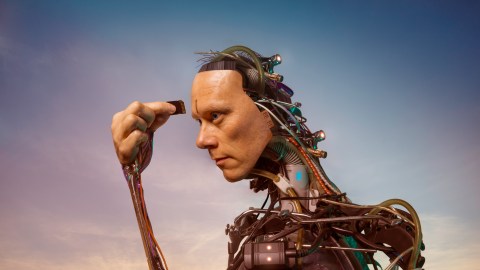Amy and Google Now: How Personal Digital Assistants Make Us Better

In October 1943, before the rebuilding of the Commons Chamber after its destruction during the Blitz, Winston Churchill addressed the lower house of Parliament: “We shape our buildings” he said, “and afterwards our buildings shape us.”
What he meant is that the way we construct our buildings impacts how we live our lives. How we build our homes, offices, and cities influences human endeavor. For example, in most homes, the dining room is next to the kitchen. There’s usually a bathroom next to the bedroom. If you extend this concept more broadly, residential areas are separate from commercial areas which are separate from industrial areas. Anyone who has played SimCity knows this fact inherently. My point is that the way our homes are structured as well as our cities and towns, influences how we go about living: where and how we eat; where and how we buy things; where and how we spend our time. Technology works the same way. We build technologies and they build us. We build tools, and those tools determine, construct, and guide our lives.

Take, for example, our mobile phones. Many Android devices come preinstalled with an application called Google Now. It’s an amazing application. It reads all of my Gmail, every message I send and receive. Because I purchase all of my music through Google Play, it knows all of my favorite bands. It knows my location 24 hours a day because I never turn off my phone (or GPS). It knows all the movies I watch because I purchase all my movies through Google Play. It knows the locations of my office and home because I’ve programmed them into Google Maps. It knows every search I’ve ever made on my laptop, mobile phone, and tablet because I use Google Chrome as my default browser and it shares my search history across those devices.
As a result, Google Now knows more about me than I probably know about myself. It tells me things before I ask it. When I step off a plane, my device tells me that my favorite band is playing at a microbrewery nearby and then encourages me to buy tickets. Google Now tells me when my flights are delayed or canceled before the airline does. It tells me 15 minutes before I leave work that there is traffic on my normal route and that I should take a different route. All in all, Google Now helps me manage my personal life.
To manage my professional life, I use Amy Ingram from X.ai. Amy, and her twin Andrew Ingram, are artificially intelligent personal digital assistants. Amy oversees scheduling of all of my work appointments. By integrating with Google Calendar, Amy books appointments, coordinates with others on meeting times and places, and generally helps offload all the back and forth we all go through to schedule meetings. There’s even rumor that Amy will be updated soon to allow for the scheduling of lunch meetings using Yelp or OpenTable.
One of the great challenges of today’s digital thinking tools is knowing when not to use them, when to rely on the powers of older and slower technologies, like paper and books.
— Clive Thompson, Smarter Than You Think: How Technology is Changing Our Minds for the Better
X.ai co-founder Dennis Mortensen, in a recent interview with Small Business Trends, argues that we are at an inflection point in our development of artificial intelligence. “I think we’ve had some sort of almost perverse fantasy for the last 50 years, where having solved AI — however we’re going to define it — out comes this human-like entity,” he says. “I don’t think that’s realistic. I don’t think I’ll see that in my lifetime. What I do think we’ll see, and certainly what I think we’re at right now, is this inflection point for where it’s certainly possible to create these verticalized AIs. That means artificial intelligence that can do one job, one well-defined job, and that extremely well.”
Both Google Now and Amy do very specific jobs exceedingly well. Having spent the last few weeks using Amy as my personal assistant, I can tell you that she is smart, understands when and how to schedule meetings, and works 24 hours a day. She never gets sick, never takes a day off, and I can talk to her whenever the mood strikes. As she becomes more advanced, I can imagine her doing lots more.
“I think we’ll get to a point to where Amy at x.ai will not just be an assistant,” Mortensen said. “She’ll be a superhuman assistant. She’ll do things to where even if you wanted to spend the $50,000 in putting a human assistant on payroll, you would choose not to. You would choose the machine because one, she’s got total recall, meaning that you and I chatted today. She will remember that forever. She won’t forget next week, not the week after, not next year, not when you want to do a follow-up in 14 months. She’ll know exactly when we chatted, what the subject was, and so on and so forth.”
This feels creepy, but I confess that I don’t mind. I like the ability to offload mundane tasks. I like to know what time to leave work so I beat traffic. But, will there be a point that I become so reliant on Amy (or Google Now) that I lose my self-sufficiency? Many of us already can’t find directions because we are increasingly dependent upon the mapping capability of our phones. If Google Now and Amy know and can remember more details about my life than I can, what does that mean? And if it means anything, should we care?





